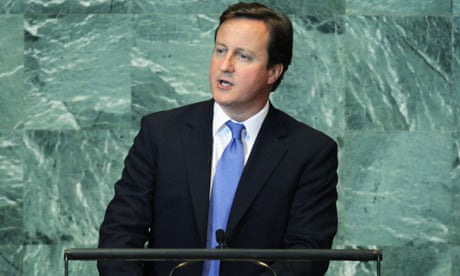David Cameron has urged the United Nations to be more ready to take action against oppressive regimes.
In a strong defence of interventionism, the prime minister said the Arab Spring uprisings and conflict in Libya demonstrated that the UN needed "a new way of working".
"To fail to act is to fail those who need our help," he told world leaders at the United Nations general assembly in New York.
Mr Cameron said the popular uprisings in North Africa and the Middle East had provided "a massive opportunity to spread peace, prosperity, democracy and vitally security" - but only if nations seized it.
"The UN has to show that we can be not just united in condemnation, but united in action, acting in a way that lives up to the UN's founding principles and meets the needs of the people," he said.
"You can sign every human rights declaration in the world, but if you stand by and watch people being slaughtered in their own country, when you could act, then what are those signatures really worth?"
The Prime Minister said the international community needed to use a combination of military action or "hard power" and "soft power" like diplomacy and financial aid.
He argued that the people of the Arab world had made clear their aspirations for greater freedom, more accountable governments and an end to corruption.
"As people in North Africa and the Middle East stand up and give voice to their hopes for more open and democratic societies, we have an opportunity - and I would say a responsibility - to help them," he said.
Mr Cameron said: "Here at the UN, we have a responsibility to stand up against regimes that persecute their people."
The Prime Minister singled out Yemen and Syria as being in need of reform.
"It is time for the members of the Security Council to act," Mr Cameron will say in reference to the repressive regime in Damascus.
The Prime Minister acknowledged that care had to be taken when delving into the internal affairs of a sovereign state, but insisted that should not be "an excuse for indifference in the face of a regime that week after week arrests, intimidates, tortures and kills people who are peacefully trying to make their voices heard".
Mr Cameron also told UN delegates that Palestinians had a right to a "viable state of their own" and that the international community should help them achieve this.
The UK is still weighing its response to an expected Palestinian push for statehood later this week.
But Mr Cameron said that no resolution could provide the "political will" needed for lasting peace and called on both Israel and the Palestinians to return to the negotiating table for direct talks.
Ahead of his speech to the UN, the Prime Minister held talks with UN Secretary-General Ban Ki-moon.
Mr Ban welcomed Mr Cameron to his first general assembly - the Prime Minister missed last year's gathering which took place shortly after the birth of his fourth child Florence.
Mr Cameron said: "This time last year I had just had a baby girl, so I was changing what you call diapers, what we call nappies."
He added that he had been given a "pass" to attend this year's event.
